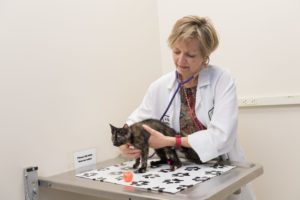Video produced by the Colorado Veterinary Medical Association
The Colorado Veterinary Medical Association named Dr. Rebecca Ruch-Gallie the 2018 Veterinarian of the Year at its annual convention Sept. 22.
Ruch-Gallie is an associate professor of clinical sciences in the College of Veterinary Medicine and Biomedical Sciences, and has served as service chief for Community Practice at the James L. Voss Veterinary Teaching Hospital at Colorado State University since the service began in 2000.
Dr. Michael Lappin, professor in the Department of Clinical Sciences and director of Shelter Medicine at the veterinary teaching hospital, hired Ruch-Gallie to launch the Community Practice clinic nearly 20 years ago.
“He essentially told me, ‘I have a really low salary that I can pay you for a year and then we probably won’t have anything after that, and that was 18 years ago,'” said Ruch-Gallie.
Lappin applauded her work with the community, CSU and the state veterinary association over the years: “Dr. Ruch-Gallie is one of the premier faculty members in the history of Colorado State.”
Here to serve the community
The Community Practice team takes care of pets with minor health concerns or injuries. They provide wellness exams, vaccines, help control parasites, perform spay and neuter procedures and conduct oral health evaluations. Veterinarians and students on this team also work regularly at outreach events that serve the community, including Project Homeless Connect, a one-day event that provides people and families experiencing homelessness with access to vital services, including medical care for their pets.
Prior to the creation of the Community Practice clinic at CSU, students received primary care training at local veterinary clinics.
Starting out in the restaurant industry
Ruch-Gallie knew that she wanted to be a veterinarian for as long as she can remember. But when she was finishing up her undergraduate studies in animal science at the University of Illinois, she was turned off by veterinary medicine, and saw the school she’d been considering as too competitive and cutthroat.
“It wasn’t anything I was interested in pursuing and I thought, maybe I wanted to do something else for a while,” she said. “So, I did,” she said, with a laugh.
She got married, and followed her husband, Keith Gallie, when he moved for his work. Her love food drew her into the restaurant business, where she worked for about 10 years in Illinois, Ohio and Colorado.
“I started out serving drinks, and then went on to serving food and bartending, managing a bar and managing a restaurant,” Ruch-Gallie explained. She helped open a fine dining Asian restaurant in Albuquerque, New Mexico, hiring and training all of the staff for “front of the house” positions.
She started to miss veterinary medicine, though, and that goal she’d set from an early age to help and work with animals.
Ruch-Gallie assumed that she would never get into veterinary school, given the detour in her career. She decided instead to focus on education and training.
“The one thing I really liked about the restaurant business was training new staff, and training new people, the teaching portion of it,” she said.
A return to veterinary medicine
Ruch-Gallie received her teaching certification from CSU in secondary science, which meant she was licensed to teach middle and high school students. She also defied the odds, and was accepted into the Doctor of Veterinary Medicine Program at CSU.
Ruch-Gallie, who also has a master’s degree in epidemiology from CSU, said that she sees parallels with her past and present careers.

“Veterinary medicine is a service industry,” she said. “I don’t think we think of it that way because it is a medical profession. But our clients don’t often have a third-party payment system. We have to make sure clients are happy with the services they’re receiving for their animals.”
Ruch-Gallie has been instrumental in highlighting the community in Community Practice.
“We’re called Community Practice, which means that we should be part of our community,” she said. To that end, Ruch-Gallie asks: where do we have underserved populations in our community, where can we give back to those communities and how can we provide those services and train students simultaneously?
Mason Miller, a fourth-year DVM student, met Ruch-Gallie during his first year at CSU while working at a student-led vaccine clinic for staff pets. He described her as a mentor, and a clinician with great communication pet-handling skills.
“She knows how to make the most out of your time when you’re here, as a client,” said Miller. “She’s a great teacher as well.”
Miller’s goal after he finishes the program is to find a position in small-animal community practice. He knows he’s in the right place, training with Dr. RG, as she’s called.
“She’s got a plethora of knowledge when it comes to things like low-restraint cat handling and getting dogs put on wellness plans and vaccine schedules, stuff that everyday veterinarians need to know,” he said. “She’s filled the role here at CSU that I see for myself out in a practice.”
Nicole Luke, a veterinary technician with Community Practice, said Ruch-Gallie is an excellent role model for students.
“She’s got a good heart and a good head on her shoulders,” said Luke. “She’s a very solid veterinarian and person. I utterly enjoy working with her, and I couldn’t ask for a better supervisor.”
Ruch-Gallie creates a calm environment in a busy clinic setting, which lends itself well for teaching and education, noted Luke. She also gives DVM students a fair amount of autonomy.
“She likes them to think about what they’re going to do, instead of just directing them,” she said. “It’s very good for the students.”
Miller said the CVMA award couldn’t have gone to a better clinician.
“She deserves to be recognized, especially in the veterinary community, in general and at large, but in Colorado specifically,” he said.